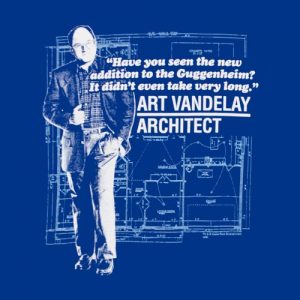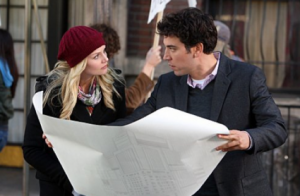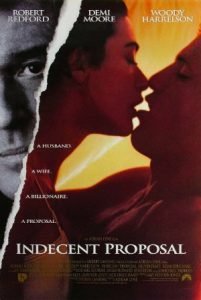The perception of an architect through film and book often is in a negative light. While teachers and doctors are seen in pop media almost always as heroes most, the architect is a creative mind removed from reality. The architect is seen as someone removed from any understanding of money, cannot maintain healthy relationships, and is a dreamer that will do almost anything for that next big commission.
For instance, Tom Hanks as Sam Baldwin in “Sleepless in Seattle” is a grieving widow that cannot sleep (which actually is not a bad thing to find success as an architect). He lived on an expensive house boat furthering the negative perception that all architects are rich.
 Jason Alexander as Art Vandelay from Seinfeld thinks being an architect can attract the ladies so he pretends to be one. He establishes that lying is ok to achieve the end he desires. He does not limit his professional lying to architecture, he also is an importer exporter among other professions.
Jason Alexander as Art Vandelay from Seinfeld thinks being an architect can attract the ladies so he pretends to be one. He establishes that lying is ok to achieve the end he desires. He does not limit his professional lying to architecture, he also is an importer exporter among other professions.
Michelle Pfeiffer as Melanie Parker in “One Fine Day” is seen trying to balance being an architect as a single mom. She builds huge models and has meetings that determine her future success in the industry. She is unorganized and barely hanging on to the complexities of life.
Robert Reed as Mike Brady in Brady Bunch portrays a man constantly at work standing over his drafting board that could not figure out a family of 6 kids (3 girls) needed more than one bathroom. One thing that always bothered me as a kid watching this show was the exterior of the house shown did not match the interior.
Richard Gere as Vincent Eastman in “Intersection” is the head of a prestigious architecture firm. He cannot find happiness or fulfillment in his life even though he has a successful career and at one point family life. The idea of the architect as a tortured soul runs through many of these characters.
 Josh Radnor as Ted Mosby in “How I Met Your Mother” is almost never at the office and when he is, he is fighting for his design voice to be heard. He lives most of his life at a bar or with a drink in his hand. He struggles with his architectural visions trying always to be a starchitect.
Josh Radnor as Ted Mosby in “How I Met Your Mother” is almost never at the office and when he is, he is fighting for his design voice to be heard. He lives most of his life at a bar or with a drink in his hand. He struggles with his architectural visions trying always to be a starchitect.
Matthew Perry as Oscar Novak in “Three to Tango” portrays again the negative perception of an architect who will not let honesty stand in the way of getting that next big commission.
John Cleese as Mr. Wiggin in Monty Python architects sketch highlights the use of conveyor belts and rotating knives in slaughterhouse designs and points the blame for not designing the right solution at the “non-creative garbage” clients force into his work.
Wesley Snipes as Flipper Purify in “Jungle Fever” portrays a young architect fighting his way up the corporate ladder just to be knocked down. He cheats on his wife and argues his value to partners that use his talent without giving him credit. Again the architect is seen as someone without ethics both in Flipper and the partners at the firm.
Woody Harrelson as David Murphy in “Indecent Proposal” is an architect so down on his luck and ethics that he is willing to auction off his wife for a night. It does not get worse than this guy when it comes to ethics.
Perhaps a better portrayal of the architects is Gary Cooper as Howard Roark in “The Fountainhead.” He is a young architect that chooses to struggle in obscurity rather than compromise his artistic and personal vision. He refuses to back down when the client demands he make changes to achieve the goals of widespread acceptance. He is torn between getting the job or changing his entire vision to satisfy his clients. In reality, we are there to guide the clients and develop their vision, not overlay our beliefs on their projects.
One of the more positive portrayals is Meredith Baxter-Birner as Elyse Keaton in Family Ties who never seemed to have issues working from home while raising a family. She found places to work on drawings around the house never letting accidents happen that set her back in design. I bet she was focused on green design solutions even though it never came up in conversation.
While all but perhaps Family Ties shows the architect in a negative light by not having high ethical standards nor being able to listen to clients demands to adapt design, the use of architects as a background for character development continues. Our profession is celebrated as a negative character flaw for the most part by Hollywood. If only we could be seen as the hero in one show or movie that brings positive solutions to communities. Instead we are left struggling along as portrayed in this YKKAP I am Architect video that shows the architect as a rap star!
Who is your favorite pop culture architect?




